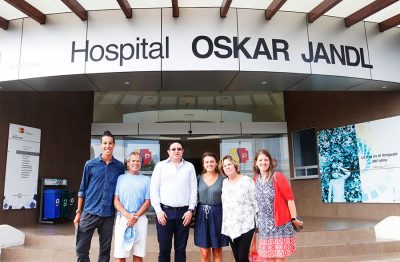NIH grant to examine human health costs of economic development in Galápagos Islands
October 17, 2017
Amanda Thompson, PhD, associate professor of nutrition at UNC Gillings School of Global Public Health, recently was awarded a two-year National Institutes of Health (NIH) grant to examine the effects of changing environments on human health in the Galápagos, Ecuador.

Posing in front of a hospital in Galápagos (l-r) are Norman Archer, UNC bachelor’s student in nutrition; Dr. Jaime Ocampo, dean of public health at USFQ; Dr. Byron Tobar, director of Hospital Oskar Jandl; Hannah Jahnke, UNC graduate student in anthropology; Dr. Peggy Bentley, distinguished professor of nutrition and associate dean for global health at the Gillings School; and Dr. Amanda Thompson, principal investigator and UNC associate professor of nutrition and anthropology. Photo by Mary Lide Parker.
Thompson, who also is associate professor of anthropology in the UNC College of Arts and Sciences, will work with Gillings School co-investigators Margaret (Peggy) Bentley, PhD, Carla Smith Chamblee Distinguished Professor of Global Nutrition, associate dean for global health at the Gillings School and associate director of the UNC Institute for Global Health and Infectious Diseases, and Jill Stewart, PhD, associate professor of environmental sciences and engineering and deputy director of the UNC Galápagos Initiative and Center for Galápagos Studies. Enrique Terán, MD, PhD, professor of medicine at Universidad San Francisco de Quito (Ecuador) is also a co-investigator.
The grant, “Water, Food and the Triple Burden of Disease in the Galapagos, Ecuador,” will explore the pathways linking water and food exposures to the dual burden of under-nutrition and over-nutrition in the country’s remote Pacific islands. An improved understanding of these connections is critical for identifying the effects of changing environments on human health and developing successful interventions for reducing obesity, cardiometabolic disease and persistent undernutrition.
Low- and middle-income countries often experience significant human health costs due to the heterogeneity in diet, lifestyle and diseases that accompany economic development. The effects of changing environments in these countries may shape early human growth and development and have lasting impacts on health and well-being throughout a person’s life. Increases in obesity and cardiometabolic disease, along with persistent malnutrition and infectious disease, become prevalent.
The research, supported by the NIH’s Fogarty International Center, is part of the partnership between UNC and the Universidad San Francisco de Quito (USFQ) in Ecuador. The UNC-USFQ partnership began in 2006 with collaboration between Stephen Walsh, PhD, Lyle V. Jones Distinguished Professor of geography at UNC, and Carlos Mena, PhD, a UNC alumnus who is professor of geography at USFQ.
The universities dedicated the joint Galápagos Science Center in 2011. The center’s 20,000’ sq., state-of-the-art facility provides space for students and faculty members to study the intersection of social, terrestrial and marine subsystems, with particular focus on human populations, social and ecological health and the environment.
UNC and USFQ faculty members engaged in study in the Galápagos represent a range of academic interests, including anthropology, biology, computer science, dentistry, economics, education, environmental sciences and engineering, geography, geological sciences, journalism, marine sciences, nutrition, political science and sociology.
Learn more about the Galápagos Science Center.
Share
Gillings School of Global Public Health contact: David Pesci, director of communications, (919) 962-2600 or dpesci@unc.edu
